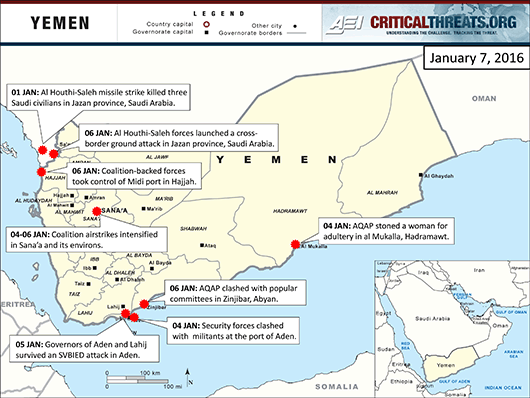Al Qaeda in the Arabian Peninsula (AQAP) is taking advantage of the Yemen conflict to expand its governance capabilities in its stronghold in al Mukalla and extend its influence in southern and central Yemen. Meanwhile, the security breakdown in Aden is undermining President Abdu Rabbu Mansour Hadi’s government, and ongoing hostilities along the Saudi-Yemeni border are drawing the Saudi-led coalition deeper into the conflict.
AQAP is now enforcing its strict interpretation of shari’a in al Mukalla, Hadramawt, marking an inflection in how AQAP has governed the city to-date. AQAP publicly stoned a woman to death for adultery in al Mukalla on January 4, but prevented photography of the event. It is the first time an AQAP shari’a court has enforced the punishment in Yemen, where stonings have not been reported. The group has used violence sparingly in al Mukalla, where it has been punishing minor infractions such as the use of hashish. AQAP’s experience in Abyan in 2011-2012, where a popular uprising drove out the group, likely informs its current governance strategy in al Mukalla. A 2012 letter from the late AQAP leader Nasser al Wahayshi reflected on AQAP’s missteps in Abyan and called for the gradual implementation of shari’a in future efforts.
AQAP is attempting to expand its presence in southern and central Yemen. AQAP forces clashed with popular resistance troops in Zinjibar, the capital of Abyan governorate, on January 5. AQAP recaptured Zinjibar and the neighboring town of Ja’ar, which it controlled from 2011-2012, in early December 2015. Ansar al Sharia, AQAP’s militant arm in Yemen, also released two videos showing the interrogation of al Houthi captives, as part of the group’s ongoing effort to build popular support by fighting alongside local anti-al Houthi fighters in central Yemen. [Videos obtained through SITE.] AQAP is attempting to capitalize on public sentiment against the al Houthi movement by moving into areas where local tribes pushed out al Houthi-Saleh forces but the Hadi government has yet to reinstate governance.
Militancy in Aden continues to challenge the coalition-backed Hadi government as groups contest control of the city. The coalition’s reliance on southern resistance militias to drive the al Houthi-Saleh forces from Aden and the continued Islamist presence in the city have prevented Hadi’s government from establishing control. Militants attempted to assassinate the governors of Aden and Lahij governorates in a suburb of Aden city on January 5, a month after an ISIS-claimed bombing killed the previous governor of Aden. It is possible that the militants were Islamist, but they might also have ties to southern secessionists. Local Yemeni security forces are also struggling to maintain control of strategic sites in Aden, as evidenced by recent clashes between local security forces and suspected Islamists for control of the port of Aden that killed 17 people. Gunmen, possibly Islamist, also assassinated a Southern Movement militia commander, as well as a moderate Sufi imam, and stormed Aden University, kidnapping the dean. Aden’s instability will continue to challenge the Hadi government’s bid to cultivate a loyal constituency in southern Yemen, as locals may look to other political leaders or groups for governance if the security situation does not improve.
Continued al Houthi-Saleh cross-border attacks are drawing the Saudi-led coalition further into the conflict along the Saudi-Yemeni border. Al Houthi-Saleh forces reportedly launched a dozen ballistic attacks on Saudi economic and military targets over the past three weeks, as well as a cross-border ground attack on January 6. Most of the missiles did not reach their intended targets, but a January 1 missile struck a residential area in southern Saudi Arabia’s Jazan province, killing three civilians. Saudi Arabia increased its airstrikes in the Sana’a region, which coalition spokesperson General Ahmed al Asiri confirmed are attempts to destroy potential missile launch sites. The Saudi-led coalition strengthened its defensive position in southern Saudi Arabia with the deployment of Kuwaiti infantrymen and artillery as well as 1,000 Emirati and Bahraini troops. Coalition-backed forces also increased their operations in Hajjah governorate, taking control of Hajjah’s port of Midi, which al Houthi-Saleh forces likely used as a supply route, on January 6. The coalition is using a general who defected from former President Ali Abdullah Saleh’s regime in March 2011, Ali Mohsen al Ahmar, as commander of a large contingent of coalition-backed troops in Hajjah governorate, partly in the hope that his extensive connections in northern Yemen could incite al Houthi-Saleh defections. Al Houthi-Saleh cross-border attacks are not an existential threat to the Saudis, but the Saudi-led coalition will remain engaged in countering the attacks, and these responses may grow in severity.
Yemen’s peace process remains stalled. Former president Saleh refused to engage in any future peace talks with representatives of Hadi’s government and said he would only meet with Saudi officials. Saleh’s refusal to meet with Hadi’s representatives likely reflects the common perception that Saudi Arabia, not Hadi, is the key powerbroker. Tensions escalated between Iran and Saudi Arabia, with Saudi Arabia severing diplomatic relations with Iran after Iranians stormed the Saudi embassy in Tehran, and Iran accusing Saudi Arabia of bombing its embassy in Sana’a on January 7. Nevertheless, Saudi ambassador to the UN Abdullah al Muallimi asserted that Saudi Arabia’s hostility towards Iran would not affect the peace process in Yemen. This is unlikely, as Saudi Arabia’s heavy involvement in Yemen and Iran’s support for the al Houthis continue to cast the Yemen conflict as one front in the regional Saudi-Iranian proxy war.
AQAP will continue to exploit the security vacuum in Yemen and will likely attempt to tighten its hold on positions in Abyan governorate. Conditions on the ground do not support an enduring ceasefire, as the Saudi-led coalition becomes increasingly engaged along Saudi Arabia’s southern border and President Hadi’s government fails to provide effective leadership in Aden.
Emily Estelle contributed research to this piece.

